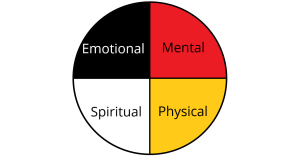3.5 Self-Care
Self-care is not a waste of time; self-care makes your use of time more sustainable.
—Jackie Viramontez
You yourself, as much as anybody in the entire universe, deserve your love and affection.
—Buddha
As you grow older, you will discover that you have two hands, one for helping yourself, the other for helping others.
—Maya Angelou
Research shows that “vicarious (secondary) trauma, compassion fatigue, and burnout can be prevented” and the key to this prevention is self-care (Wolpow et al., 2016, p. 58 ). But what is self-care? You may notice by now that self-care is a topic discussed a significant amount in Child and Youth Care education. Many of your courses will have a component of self-care incorporated into the curriculum. But what is it exactly? And why is it so important?
Self-care is about enhancing your overall well-being, not just about addressing barriers and challenges as they arise. It is a way of living, a commitment to making yourself a priority to ensure you are effective and successful through all your personal and professional responsibilities. It is about “creating and maintaining practices that help you sustain your energy and spirit” and “it also makes you a better friend, community member, lover, partner and caregiver” (Khan, 2015, p. 4).
Reflect
Ask yourself the following questions:
- What does self-care mean to me?
- Have I practiced self-care in my life?
- Do I think that self-care is important?
- Have there been times in my life when I have neglected taking care of myself?
Here are six areas of self-care and examples of actions for each area to ensure overall wellness:
- Physical self-care: The things I do to improve my body in healthy ways. Examples include sleep, nutrition, exercise, and health care visits.
- Emotional self-care: The things I do to deal with my feelings in healthy ways. Examples include talking about feelings, creating a positive support system, seeking counselling or therapy as needed, and journaling.
- Social self-care: The things I do with others and the world around me. Examples include interacting with friends and family members who energize and support us, playing, having fun, celebrating milestones and successes, and belonging to groups and communities.
- Cognitive self-care: The things I do to improve my mind and understand myself better. Examples include reading for pleasure and for work, writing, continuing education, and learning something new.
- Financial self-care: The things I do to stay financially responsible. Examples include responsibly spending and saving money, balancing my bank account, and establishing future financial plans.
- Spiritual self-care: The things I do to gain perspective on my life. Examples include prayer, meditation, contact with nature, and attending religious services.
Indigenous Medicine Wheel
Child and youth care focuses on a holistic, ecological perspective to caring for children, youth, and families; therefore, a framework that is often used when looking at self-care is the Indigenous Medicine Wheel. The Medicine Wheel is a very deep and complex symbol that represents the circle of life. Core concepts of the Medicine Wheel are balance, harmony, and interconnectedness. The four directions of the Medicine Wheel remind us of the need for balance in the world and within ourselves. The Medicine Wheel presents a complete picture of a person in their environment and “provides a map or plan for problem solving, for enhancing one’s awareness and understanding of self and for restoring healthy relationships and general well-being” (Loiselle & McKenzie, 2006, p. 14).

Looking at this Medicine Wheel, you will see there are four aspects included in one’s Self. These aspects include:
- Physical/Material
- Emotional/Social/Relational
- Mental/Intellectual/Cognitive
- Spiritual/Ethical/Cultural
Apply Your Learning
Examples of Self-Care
Review the following examples of self-care activities for each of the four domains from the Medicine Wheel:
Table 1: Examples of Self-Care for Each Domain
Domain |
Examples of Self-Care |
|---|---|
| Physical |
|
| Emotional |
|
| Mental |
|
| Spiritual |
|
Developing a Self-Care Plan
Now that you have had time to better understand self-care and have reflected on how you might be practicing it in various aspects of your life, it is time to look at creating a sustainable self-care plan that will ensure your overall well-being as a CYC. Developing an overall holistic approach to self-care will allow you to “show up” fully in all aspects of our lives.
Apply Your Learning
Work through the following tasks to develop your self-care plan.
- Go back and review the Wellness Wheel you completed earlier in the module. Look at which of the areas you might need to improve on, and develop three goals you hope to attain with regards to self-care. Do you need to focus more energy on a specific domain of your self-care?
- Complete the My Self-Care Plan (this link will open in a new page) document, and bring it to class with you.
Media Attributions
- medicine_wheel © Amanda Baker Robinson is licensed under a CC BY-SA (Attribution ShareAlike) license

